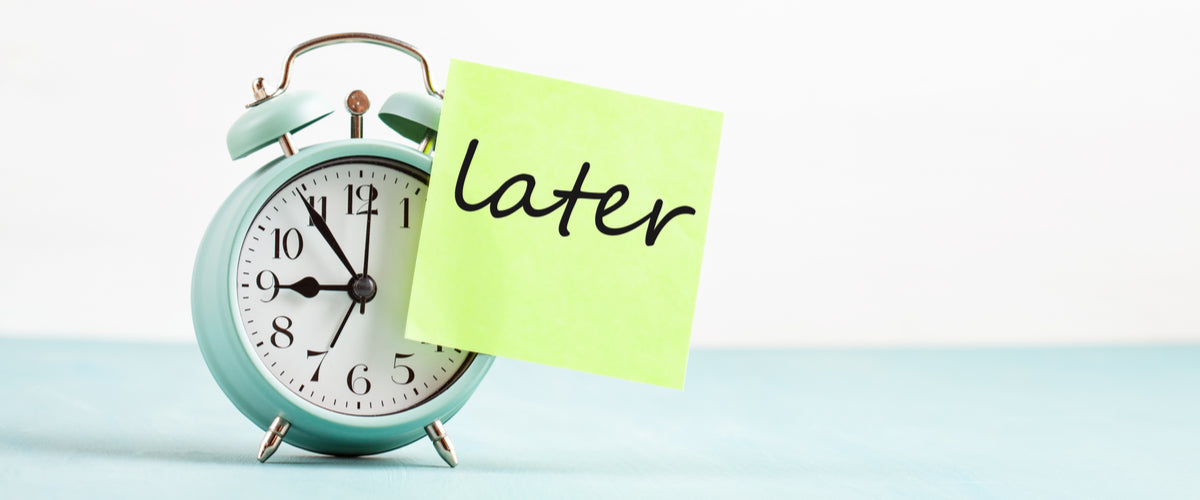What Is the Revenge Bedtime Procrastination Phenomenon?

In short, revenge bedtime procrastination (RBP) is the voluntary decision to sacrifice sleep for either an activity or leisure. Those lacking in free time due to a busy day-to-day schedule can suffer from RBP.
Those most affected by revenge bedtime procrastination are individuals with stressful and time-consuming jobs. Work, eat, sleep becomes all too real. Everybody needs leisure in their lives outside of the weekend. Unfortunately, many people feel they have to sacrifice sleep to achieve it.
Sleep deprivation can lead to sever short-term and long-term side effects.
Sleep deprivation can lead to severe short-term and long-term side effects. While watching one more hour-long episode of your favorite show may feel tempting, is it worth sacrificing a restful night's sleep?
Recognizing when you're suffering from sleep deprivation is vital to your mental and physical well-being. Understanding how to combat bedtime procrastination can aid in a more restful night's sleep.
Who Does Revenge Bedtime Procrastination Affect?
In an interview with Health.com, sleep expert Terry Cralle, RN, refers to RBP as "A failing to go to bed at an intended time in order to claim some much needed 'me time."
A study conducted by the National Library of Medicine found the students and women are most affected by RBP. Furthermore, those who tend to procrastinate in their day-to-day lives are more likely to procrastinate going to sleep.
In most cases, bedtime procrastination links to long or extended daytime work hours. Take students, for example. A full day of classes followed by an entire afternoon and evening of homework and study leaves little room for leisure, or "me time," before going to bed.
A Harvard survey found that the rise in work-from-home employees has led to extended work hours.
COVID-19 and Bedtime Procrastination
A Harvard survey found that the rise in work-from-home employees has led to extended work hours. Moreover, women, more specifically mothers, have had to juggle work and childcare more than fathers have.
The home has become the workplace, and, for some people, it's been hard to distinguish between the two. Distraction is easy when working from home. Everything you need to entertain yourself is right there.
This can lead to extended work hours and a decline in productivity. While you're getting the same amount of work done in a day, it's taking longer because of distractions, and that's okay.
A Library of Medicine Study assessing the effects of the COVID-19 pandemic on sleep habits found that 40 percent of people have reported poor sleep habits during the pandemic.
Behaviors Associated with Bedtime Procrastination
It's not hard to spot if you suffer from bedtime procrastination. Most of the time, the same behaviors associated with procrastination in your day-to-day life apply.
While most procrastination involves activities you'd prefer not to do, like housekeeping chores, bedtime procrastination sacrifices long-term sleep benefits for short-term entertainment.
There are two distinct subcategories of sleep procrastination:
- Bedtime procrastination involves delays in getting into bed, including short-term entertainment like playing video games, watching movies, and socializing with friends.
- In-bed procrastination occurs when you've gotten ready for bed, but your social media feeds and text messages are keeping you from closing your eyes.
In both cases, you'll ultimately end up suffering from sleep deprivation effects. Also, bedtime procrastination often includes or leads to in-bed procrastination.
Potential Consequences of Bedtime Procrastination
Regardless of how or why you put off sleep, bedtime procrastination often leads to sleep deprivation and sleep disorders, which can have physical, emotional, and cognitive side effects. For example:
- Sleep Deprivation Side Effects– Sleep deprivation is the most apparent consequence of bedtime procrastination. Lack of sleep can directly affect your memory while also having adverse effects on reaction time and alertness.
- Developing Sleep Disorders– Staying up late every once in a while won't be detrimental to your health. However, regular bedtime procrastination can lead to the development of disorders such as insomnia and microsleep.
- Worsened Symptoms of Anxiety and Depression–Those who live with anxiety and depression can often link their symptoms with sleep deprivation. In many cases, anxiety and depression make it more difficult to fall asleep, and lack of sleep can make anxiety and depression symptoms worse.
Don't Procrastinate Sleep Health Improvements
Bedtime procrastination often relates to a lack of free time during the day. Sleep deprivation leads to poor cognitive function and translates to extended work-from-home hours. Longer hours make for less "me time," which brings us right back to bedtime procrastination. It's a vicious cycle.
Establishing a healthier work-life balance, stress management, and spending free time more "efficiently" can all help you on your journey to better sleep health.
Disclaimer: Nolah does not provide medical advice. All resources on the Nolah blog, including this article, are informational only and do not replace professional medical counsel. Talk to your doctor about any health, mental health, or sleep-related issues.


